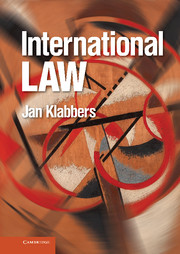Book contents
- Frontmatter
- Contents
- Detailed table of contents
- Table of cases
- Preface
- List of abbreviations
- Part I The structure of international law
- 1 The setting of international law
- 2 The making of international law
- 3 The law of treaties
- 4 The subjects of international law
- 5 Jurisdiction, powers and immunities
- 6 The individual in international law
- 7 The law of responsibility
- 8 International courts and tribunals
- 9 Sanctions, countermeasures and collective security
- Part II The substance of international law
- Part III The surroundings of international law
- Bibliography
- Index
- References
5 - Jurisdiction, powers and immunities
from Part I - The structure of international law
- Frontmatter
- Contents
- Detailed table of contents
- Table of cases
- Preface
- List of abbreviations
- Part I The structure of international law
- 1 The setting of international law
- 2 The making of international law
- 3 The law of treaties
- 4 The subjects of international law
- 5 Jurisdiction, powers and immunities
- 6 The individual in international law
- 7 The law of responsibility
- 8 International courts and tribunals
- 9 Sanctions, countermeasures and collective security
- Part II The substance of international law
- Part III The surroundings of international law
- Bibliography
- Index
- References
Summary
INTRODUCTION
States, being sovereign, can in principle do within their territories as they please: they can legislate as they please, they can prosecute anyone who violates their laws and they can lock up anyone who commits a crime. In international law language, it is often said that states have jurisdiction over their territories, and that this jurisdiction is, in principle, exclusive and unlimited.
In practice, needless to say, things are not quite as dramatic. While it is true to say that states enjoy jurisdiction, they sometimes have to compete with other states to be able to prosecute the same acts. Moreover, historically the practice has been built that states shall not subject other states and their representatives to their jurisdiction; hence the existence of state immunity (or sovereign immunity) and of diplomatic privileges and immunities. This chapter will address the jurisdiction of states as well as the functional equivalent of the powers of international organizations; jurisdiction and powers help determine what it is that states and international organizations are legally entitled to do, and are therefore indispensable complements to the discussion in the previous chapter.
- Type
- Chapter
- Information
- International Law , pp. 91 - 106Publisher: Cambridge University PressPrint publication year: 2013



